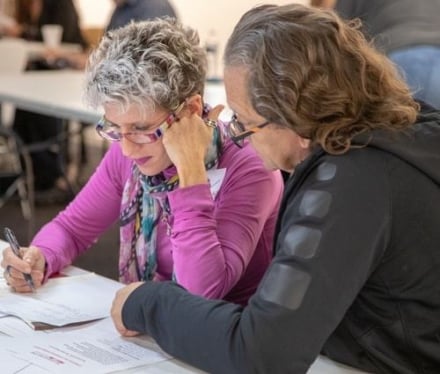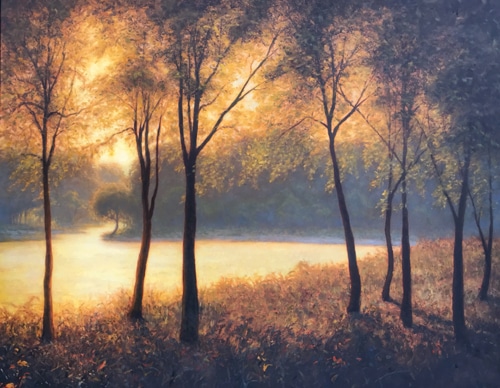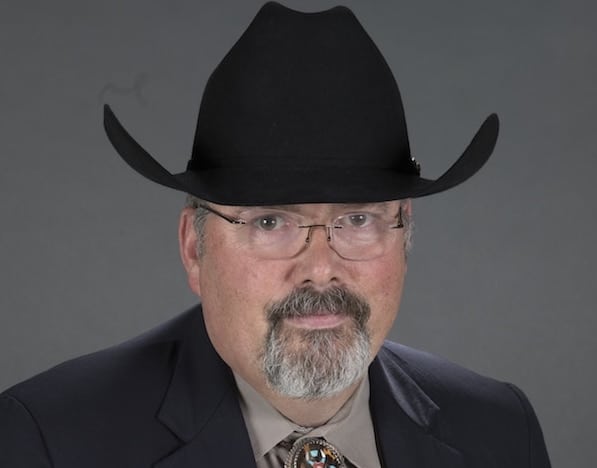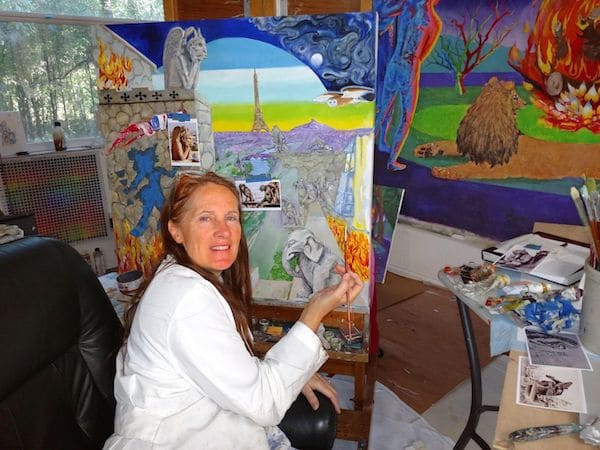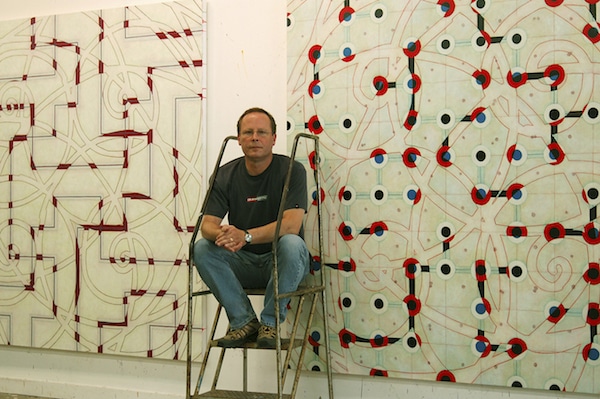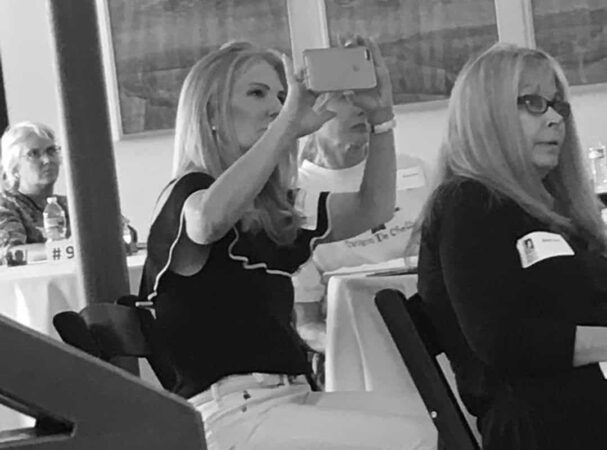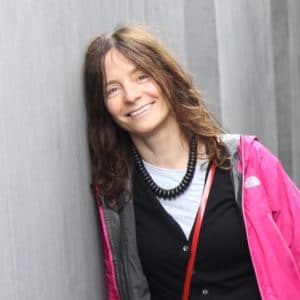 2017 Accelerator Fellow
2017 Accelerator Fellow
Where did you grow up?
I spent the first half of my life in Istanbul and then moved to Boulder, Colorado, where I currently live.
When/how did you first know that you wanted to be an artist?
The men in my family were all born with a strong talent for storytelling and drawing, and the women are equally creative, expressing themselves through crafts. My passion for the arts grew out of being surrounded by their imaginative stories and witnessing the joy they displayed in creating them.
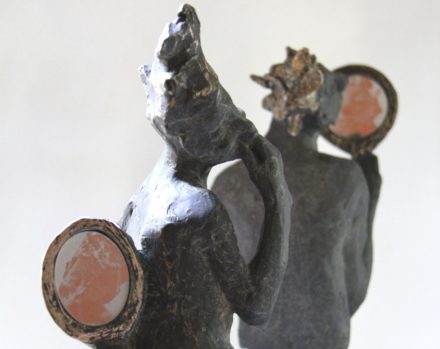
I earned my doctoral degree in engineering and went into that field, which seemed the path for me at the time. I enjoyed that work for many years, but I also longed to create. In 2011, I finally got the courage to make a change and become a full-time artist.
Where do you currently live/work, and how would you describe the arts community there?
Boulder has a large artistic community, but the city does not have a true contemporary arts scene. Exhibition opportunities are limited, as is interest in visual arts. I love the cozy small-town feeling of the city’s performing arts events, but the lack of contemporary visual arts is disappointing.
How would you describe your art to someone who’s never seen it?
My art is dynamic; it changes depending on what I want to say. I create installations and sculptures, and I also make movies and audio exhibitions. The form of my art is dictated by the subject matter.
I generally work in series. The theme of a series could be something I’ve carried with me since childhood, a cultural idea I’d like to preserve, or a troubling current event that is besetting humanity, such as the refugee crisis. To create my art, I employ a combination of modern and traditional techniques and approaches, and I try to present my ideas in a simple, poetic manner.
What do you hope to communicate to your audience?
I seek to create awareness of certain values. For example, my bronze sculpture series Journey of a Thousand Years is about self-knowledge. In my Words installation, which includes an audio element, I was encouraging people to listen to each other more. In Floating Children, a collaboration with photojournalist Brian Rutter, the installation featured transparent fabric that had been printed with photographs of Syrian children and hung from the ceiling so that the images appeared to float; it was my way of speaking to the fragility of children in times of war.
I also use my art to preserve and promote my culture. My last two solo exhibitions, Clothes from the Past and Ethereal Shoes, were intended to bring history to life by creating sculptural clothes and shoes based on styles that were previously in vogue in Turkey.
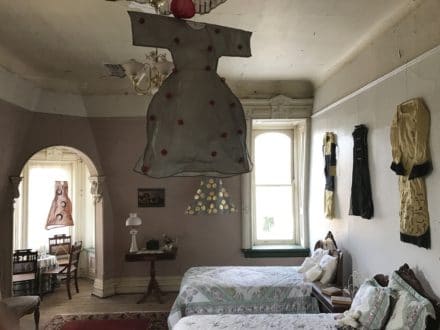
What’s been your biggest business challenge?
It has been hard to find an effective method for getting recognized locally, nationally, and internationally. It is happening slowly—I’ve had solo shows and my work was recently reviewed in art magazines—but not to the degree that might generate regular sales or invitations to talks and shows.
Tell us about a business success and what you did to achieve it.
I obtained gallery representation shortly after building my first portfolio, thanks partly to my confidence, insistence, and a little bit of “being in the right place at the right time.” First, I attended a local sculpture show and introduced myself to the owner of a gallery that I wanted to represent me. Then, I visited her gallery and showed her some of my work. She liked what she saw and was deeply touched by one sculpture in particular—a piece entitled Absence of Humanity, which I created right after the nuclear disaster at Fukushima in Japan.
How do you feel about today’s technology (tools for your business, for creating your art, or both), and has it altered your way of doing business?
We are living in exciting times. We are able to access all kinds of information, tell thousands of people that we exist through social media, and use drones to take aerial photos of the Great Wall of China. I use digital-audio editors, video-editing software applications, graphics editors, and email marketing services. For my next series, I plan to introduce high-tech components into the sculptures themselves.
But I am also a believer in tradition, and I find the creations of previous generations to be compelling, so I will always look for a way to combine traditional approaches with the exciting new opportunities that technology offers us.
What do you think about the state of today’s art market?
The art market seems to be broader than it was 50 or 60 years ago, and art is more accessible via the Internet. Beyond traditional marketing opportunities, artists can now use online art platforms, galleries, and shows; this is encouraging and perplexing at the same time. In order to have a voice, artists need to find a way of adapting to this new online market.
Give us an example of how you balance studio time with business time.
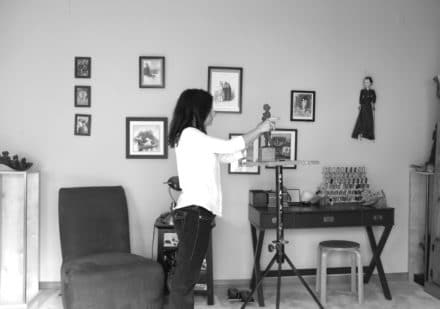
I recognize the value of having a balance between creating art and sustaining an art business. I do not allocate a specific time for business development and marketing, but I do apply for grants and shows on a regular basis in the gaps between studio time. I have also established a method for inventorying and tracking my work, as well as an accounting system that I update on a regular basis.
How have you evolved as an artist?
I was formally trained as a sculptor and have also learned how to paint, make jewelry, and do printing. My expertise in each of these areas contributes to the others, in terms of design, material selection, and technique. I do not confine myself to the knowledge I’ve already acquired. When a certain art form is the most suitable way to materialize an idea, I invest time in mastering it. Since my work is driven by philosophical ideas, humanistic concepts, current debates, and history, I do a lot of research and reading on specific topics throughout the design and creation phases. I am continuously going through the process of self-training—taking mental notes during my travels, museum visits, concerts, operas, performances, and movies—and all of these experiences contribute to my artistic and personal growth.
How have you evolved as an entrepreneur?
By being organized and determined. Once I had completed enough work, I started creating professional portfolios and catalogues, and submitting them to shows at art organizations and universities. I also began regularly applying for grants. I am currently searching for a place to build a studio space and a community/exhibition center for artists.
What role do artists play in our society? What role SHOULD they play?
Art is an enticing display of the artist’s inner world. It soothes the eye, gives us solace, and makes us think, but these results can only happen when artists are true to themselves. When freedom of expression is limited, or when artists pander to society’s desires, their art loses its truthfulness. Artists should also reflect society and raise awareness about values, social and political issues, and historical events. Whether it is a movie, a photograph, or a sculpture, art reaches our hearts in a beautifully compelling manner.
For more information on Belgin Yucelen, see her official CHF bio.



